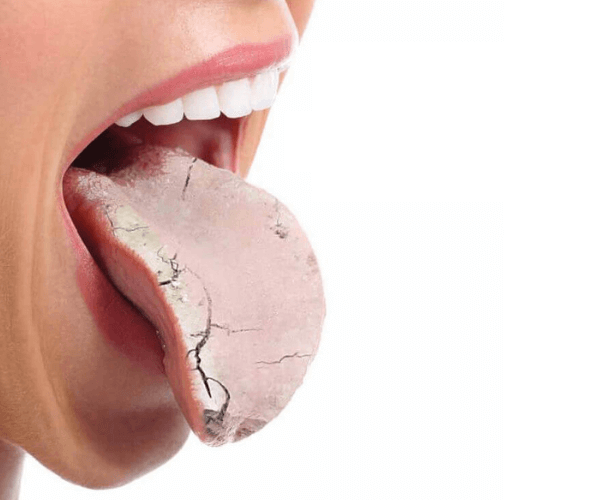Author: Lizzie Smith – blog last updated on Saturday 3rd February 2024
Dry mouth (xerostomia) is common and usually feels unpleasant. But that isn’t the only problem. A lack of saliva is disastrous for your oral health. It increases the risk of bad breath, gum infections and caries (cavities).
In this article, we’ll look at the possible causes of a dry mouth. And also how you can remedy it or at least alleviate dry mouth complaints.
What is dry mouth?
Your salivary glands naturally produce enough saliva to keep the oral cavity hydrated, which keeps the oral tissues supple and protects them from dehydration. However, if you don’t have enough saliva in your mouth, you’ll only notice what you’re missing. A dry mouth is an unpleasant feeling in itself. But you can also experience the following complaints:
- A sore throat and a scratchy, hoarse voice. This can make talking more difficult and even painful. Swallowing and eating, particularly dry food can also become problematic and painful.
- A dry mouth can make you feel like your tongue and lips are burning. Your tongue can also stick to the roof of your mouth. Other tissues nearby, such as your nose, sinuses and lips, can dry out, irritating those areas.
- Dry mouth complaints can affect your sleep, and you may regularly wake up feeling thirsty.
- Your taste buds may not function as well, and sometimes, your taste may disappear altogether. But a lack of saliva can also cause a bad taste in your mouth.
Finally, a shortage of saliva has several negative consequences for your oral health. Sufficient saliva keeps the acidity in the oral cavity in balance and provides natural protection against harmful bacteria. These bacteria have plenty of opportunity to multiply in a dry mouth. Hence, a dry mouth increases the risk of oral problems, including bad breath, fungal infections (candida albicans) and tonsil stones. As there’s increased plaque and tartar, there’s a greater risk of gum and dental problems.
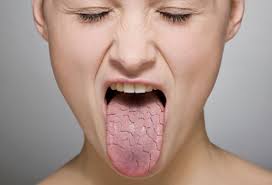
Therefore, always take dry mouth complaints seriously. Investigate the cause of your dry mouth and take measures if necessary.
Causes of dry mouth
Various causes can lead to dry mouth complaints:
- Dehydration of the body
- Medicines and severe medical treatments
- Poor functioning of the salivary glands
- Mouth breathing
- Hormones
- Medical conditions
- Psychological complaints
- Lifestyle-related factors
- Certain ingredients of toothpaste and mouthwash
Read more about the causes of a dry mouth here.
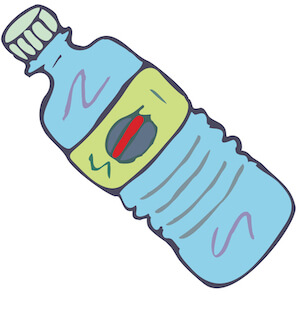
Firstly, It’s a good idea to determine what’s causing your dry mouth symptoms and, if necessary, discuss this with your doctor. Sometimes, the cause can’t be removed, for example, after severe medical treatment, surgery, or when taking necessary medication. But you can still alleviate the complaints. This isn’t only important for a more pleasant feeling in your mouth, easier talking, eating and sleeping. A hydrated mouth is also essential for your oral health and the preservation of your teeth.
How to resolve dry mouth complaints:
1. Follow some general lifestyle rules.
Firstly, drinking enough water to prevent dehydration is a good idea. In addition, it’s advisable to stop or reduce caffeine-containing and alcoholic drinks. Salty and highly spicy foods don’t help to tackle dry mouth complaints either. Whilst these things are probably not the real cause of your dry mouth, paying attention to them will at least ensure the complaints don’t worsen unnecessarily.
2. Use mouth-friendly oral care products
The same goes for the ingredients of your toothpaste and mouthwash. If they contain substances such as alcohol, SLS (sodium lauryl sulphate) or unnecessary chemicals, they can further dry out and irritate your dry mouth. In any case, choose mouth-friendly toothpaste and mouthwash:
- JuliBrite toothpaste and mouthwash have a unique formula based on active oxygen generated by honey. Together with zinc, this is exceptionally effective against harmful bacteria, but with respect for the oral flora. The body’s own enzyme, hyaluronan, is anti-inflammatory and antioxidant. Xylitol is also added to prevent plaque, while the fresh, cool taste stimulates the salivary glands. These effective yet mild products hydrate your mouth, clean your teeth and care for the soft tissues in the mouth.
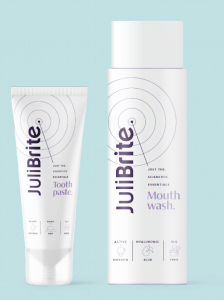
- With RyttPro toothpaste and mouthwash, you also combat harmful oral bacteria in a mild way that doesn’t dry out the mucous membranes. The effective formula OZ-3X is based on the combination of stabilised chlorine dioxide, zinc and cetylpyridinium chloride (CPC). These substances clean the mouth well, respecting the natural balance of the oral flora.
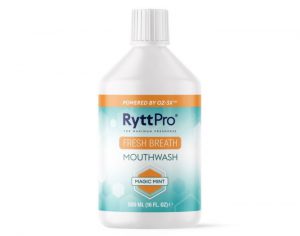
Special products to prevent dry mouth
The above tips, general lifestyle rules, and the use of mouth-friendly toothpaste and mouthwash may be sufficient in mild cases of dry mouth. However, if you can’t remove the cause and/or the dry mouth complaints are severe and long-lasting. Fortunately, there are plenty of special resources for this. This way, despite persistent or unavoidable dry mouth complaints, you can still take good care of your teeth and have a smooth mouth feel.
1. Mouth spray
A moisturising mouth spray is one of the most effective remedies for dry mouth. A good spray moisturises the oral mucosa and stimulates the salivary glands. Of course, the ingredients are also essential. Moisturising mouth spray shouldn’t be counterproductive because of any drying or acidifying components that disrupt the oral flora. The following sprays meet all the conditions, so you can use them as and when needed:
- Dr. Brite Dry Mouth Spray is a moisturising spray that contains natural, organic ingredients. The mild formula with coconut oil, aloe vera and glycerin softens the tissues. Xylitol, various essential oils, and medicinal plant extracts clean and care for the teeth and oral cavity.
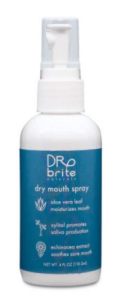
- OraRelieve Moisturising Mouth Spray has been specially developed for people with dry mouth complaints. The formula is based on the body’s own enzymes, which soften and hydrate the tissues in the mouth. The natural sweetener xylitol prevents plaque forming, so your teeth are protected. In addition, its fresh, cool taste stimulates the salivary glands.
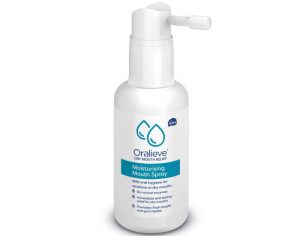
- Moist-R Dry Mouth Spray hydrates and soothes the oral mucous membranes through glycerin and aloe vera. Added minerals care for teeth, as does xylitol, which, together with natural peppermint, gives a fresh taste that stimulates saliva production.
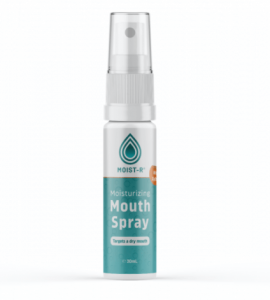
2. Dental care chewing gum or tablets
Chewing gum also stimulates saliva production, which can help prevent a dry mouth. Of course, the chewing gum must be sugar-free and contain xylitol. This inhibits plaque formation, stabilises the acidity in the mouth and supports the oral flora. The cool, fresh taste of xylitol also stimulates the salivary glands.
Moist-R Hydrating Chewing Gum is suitable for treating a dry mouth. If you don’t like chewing gum, Moist-R Xylitol tablets for Dry Mouth have the same dental care ingredients.
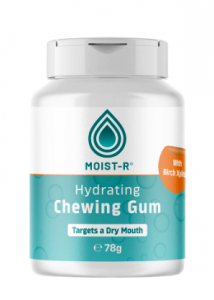
3. Dry Mouth Packs
A dry mouth package gives you everything you need for an intensive and responsible approach to dry mouth complaints. This way, you can have a smooth mouth feel at different times of the day and, at the same time, properly clean and care for your teeth.
- The OraRelieve Dry Mouth Package contains toothpaste, mouthwash, gel and spray. All these products are based on the above-mentioned moisturising and caring formula of the body’s own enzymes.
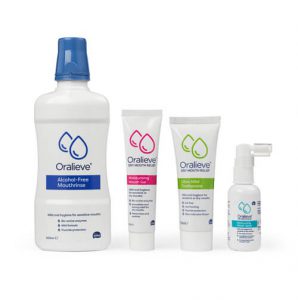
- The UK Organics Orange Dry Mouth Package is natural, vegan and environmentally friendly. The simple formula is based on coconut oil and refreshing orange oil. The toothpaste also contains salt for cleaning teeth and natural minerals to restore and strengthen tooth enamel. The accompanying mouth oil is based on the age-old Ayurvedic cleansing ritual of “oil pulling”. Both toothpaste and mouth oil soften and moisturise the soft tissues in the mouth but also effectively inhibit plaque and strengthen tooth enamel.
4. TonsilFresh Dry Mouth Strap
Sleeping with your mouth open certainly doesn’t help prevent dry mouth complaints. If this plays a role, the TonsilFresh Chin Strap can be helpful. This chin strap ensures you keep your mouth closed while you sleep. You can also adjust the band to the size and shape of your head. Sleeping with your mouth closed prevents the continuous flow of air into your mouth, which reduces the dehydration of your oral mucous membranes and also prevents snoring.

5. Moisturising gel
If you have a dry mouth, it can be very annoying, especially at night, as it can wake you up. Using a good gel to prevent dry mouth before going to bed can significantly improve your night’s sleep.
- The above-mentioned brand, OraRelieve, also has a good gel to prevent dry mouth. Like their other products, the gel works with the help of enzymes. Applying a little gel over your teeth, tongue and inside of your cheeks immediately creates a moist and supple environment.
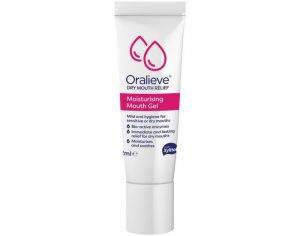
Finally
The causes of a dry mouth are diverse. If you still use oral care products with drying ingredients or if you sleep with your mouth open, the solution is simple. However, if your dry mouth complaints are persistent or the special products don’t sufficiently solve them, you should consult your doctor.
There may also be an underlying condition in which dry mouth is a symptom. For example, Parkinson’s disease and Sjögren’s syndrome – an autoimmune disease in which glands that secrete fluid, such as the salivary glands, are inflamed. Psychological conditions such as stress, depression or an anxiety disorder can also cause dry mouth complaints.
Sources
British Dental Nurses‘ Journal: Diagnosing and managing dry mouth
British Dental Journal: Helping to alleviate the stress of dry mouth

